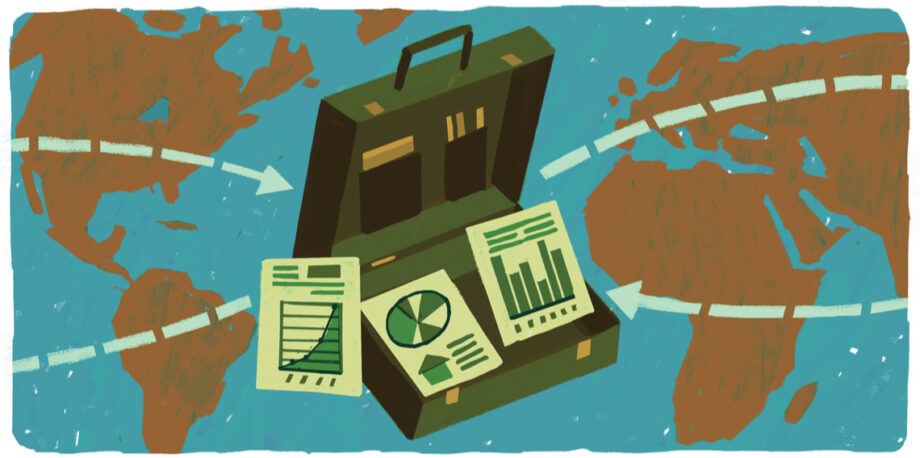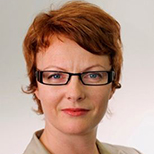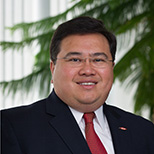April 15, 2014 — Introduced by John Elkington two decades ago, the “triple bottom line” has helped shape the definition of sustainable business today. Giving equal importance to three indicators — social, environmental and economic — this approach has enabled forward-thinking corporations to measure their success in terms of environmental and social responsibility in addition to their own financial results.
Over the years, the way corporations have embraced the concept has evolved — from making charitable donations to examining the footprint of their operations, from becoming more involved in their communities to redefining their role in building a more sustainable world. One emerging trend today focuses on fostering sustainability leadership by training future corporate leaders through sustainable development programs — an approach that both embodies and extends the triple bottom line philosophy by creating a self-perpetuating sustainable business cycle.
The Power of ICV
Corporations are full of highly skilled employees who use their unique set of knowledge and skills to advance the company’s interests. Today, some companies are utilizing this powerful resource to build a better world outside the walls of their headquarters. Through international corporate volunteerism, or ICV, companies are increasingly encouraging — and sometimes even financially supporting — their employees to volunteer their time and knowledge on community-betterment projects at home and around the globe.
The potential impact of bringing experts into these areas and pairing them with local organizations and communities in dire need is almost impossible to overestimate.
Take, for example, an engineer whose job is to design advanced technologies to treat wastewater. What if she traveled to India to help establish sanitation infrastructure in a poor community, or flew to Haiti to assist with disaster relief? Or what if pharmaceutical researchers were sent to Africa to help prevent malaria or HIV? The potential impact of bringing experts into these areas and pairing them with local organizations and communities in dire need is almost impossible to overestimate. Imagine what we could do if this approach were widely adopted, or — taking the idea a step further — if corporations combined their expertise and collaborated to solve global challenges. Could we feed the world’s hungry? Could we eradicate AIDS?
A Triple Bottom Line Education
Each year numerous corporations, including IBM, SAP, EY, Merck, GlaxoSmithKline and Dow (where we work) do just this, sending a select group of employees into emerging markets to help address local needs. While these programs are good for society and the world, they are also beneficial to companies in the long run, as was discussed in a recent Twitter chat hosted by CSRwire and PYXERA Global. Participants gain real-life experience facing complex challenges in emerging markets — resulting in an accelerated learning experience unlike any that could be taught inside the company’s walls, or often even within its own community.
Employees chosen for these programs work to identify the needs of the partner community in areas such as agriculture, housing, water, public health and sanitation. They then combine any existing, local efforts in these areas with relevant, world-class capabilities — such as their unique technology competencies or subject-matter expertise — and work to implement solutions that help address and resolve underlying challenges.
Nonprofits like PYXERA Global — which specializes in pairing multinational corporations with social enterprises, non-governmental organizations and governments for on-the-ground engagement — help enable such efforts. These organizations identify underserved markets that are potential growth opportunities for businesses and bring together what might otherwise be unlikely partners in an effort to create a beneficial situation for all involved.
IBM, for example, launched the Corporate Service Corps, or CSC, in 2008, a leadership development program for company employees that delivers cutting-edge problem solving from one of the world’s top technology companies to communities and organizations in emerging markets. In this program, IBM places teams of 10 to 15 individuals with a range of professional skills and from various countries in emerging markets for four-week assignments, working at the intersection of business, technology and society. Since CSC’s launch, more than 2,400 participants have positively affected more than 140,000 people.
Participating employees received unparalleled learning and leadership development experience as they partnered with local NGOs to develop a variety of strategic plans to be used immediately on the ground.
Meanwhile, health care company GlaxoSmithKline’s PULSE Volunteer program, which launched in 2009, has sent hundreds of employees from around the world to 57 countries to help nonprofits that work on healthcare accessibility and issues related to children. For example, realizing how difficult diagnosis of curable diseases can be in remote, rural regions, Graham Simpson, a GSK PULSE fellow who spent six months in Kenya, introduced the idea of paper-based diagnostic kits that are cost-effective, accurate and readable by health workers with little training. GSK embraced the idea and now supports and funds student groups at Johns Hopkins University researching affordable, paper-based diagnostics. Additionally, GSK’s research and development team is now identifying external providers that produce low-cost diagnostics and supporting them with advice on diagnostic development, product quality and regulatory practices. Although PULSE is not a formal leadership development program, participants similarly benefit from learning experiences unlike any other.
In 2013, Dow’s high-potential leadership development program partnered with the Dow Sustainability Corps and PYXERA Global to build a new curriculum for future leaders. The Dow Leadership in Action – Ghana Community Development Project was born, which engaged 36 future leaders from 24 countries to work on complex, local issues in Accra, Ghana. Participating employees received unparalleled learning and leadership development experience as they partnered with local NGOs to develop a variety of strategic plans to be used immediately on the ground — ranging from growing medicinal plants as cash crops, to improving water and sanitation in slums.
Triple Bottom Line at Its Best
Despite the potential long-term and wide-ranging benefits of these efforts, some will insist that programs like these are simply — and only — an attempt to enhance a company’s reputation, particularly with a public that is increasingly interested in environmental and social issues. These programs may have a positive impact on a company’s reputation in some cases. But this does not contradict the principles of the triple bottom line in any way; the third component, economic advancement, has always been considered as important as the other two.
What kind of world would we have if businesses were run by leaders who earned their stripes preventing the spread of malaria, feeding the hungry or bringing clean water to Africa?
The opportunity behind the triple bottom line is that when all three elements come together, powerful things can happen: Solutions come to light that are beneficial to the environment, society, business and the world. To reap the full benefits of the triple bottom line, corporations should not only engage in ICV but also incorporate it into their formal leadership development programs. This step will naturally build more sustainable business plans as ICV provides new global perspectives, increased engagement, higher retention rates and ultimately better leadership for the next generation of business leaders — who will in turn help incorporate more elements of environmental and social sustainability into how they lead.
This is truly the triple bottom line at its best. Beyond the benefits to the employees, these programs can be a win-win-win for society, the environment and business. Just think: What kind of world would we have if businesses were run by leaders who earned their stripes preventing the spread of malaria, feeding the hungry or bringing clean water to Africa? If we keep it up, we might just be able to find out. ![]()
Editor’s note: The views expressed here are those of the author and not necessarily of Ensia. We present them to further discussion around important topics. We encourage you to respond with a comment below, following our commenting guidelines, which can be found here. In addition, you might consider submitting a Voices piece of your own. See Ensia’s “Contact” page for submission guidelines.
Ensia shares solutions-focused stories free of charge through our online magazine and partner media. That means audiences around the world have ready access to stories that can — and do — help them shape a better future. If you value our work, please show your support today.
Yes, I'll support Ensia!

